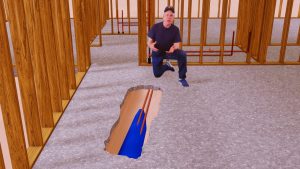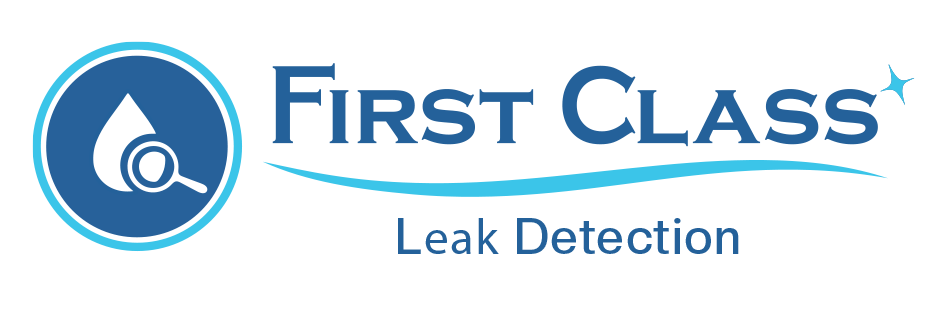 A water leak under a concrete slab—often referred to as a slab leak—can be one of the most serious and costly plumbing issues a property owner can face. Because these leaks happen beneath your home or building’s foundation, they’re not always visible and can go undetected for weeks or even months. However, if addressed promptly, you can avoid major structural damage and expensive repairs.
A water leak under a concrete slab—often referred to as a slab leak—can be one of the most serious and costly plumbing issues a property owner can face. Because these leaks happen beneath your home or building’s foundation, they’re not always visible and can go undetected for weeks or even months. However, if addressed promptly, you can avoid major structural damage and expensive repairs.
In this article, we’ll cover the causes, warning signs, detection methods, and solutions for dealing with a water leak under a concrete slab.
What Causes a Slab Leak?
Several factors can lead to a water leak beneath a concrete slab. These include:
1. Corroded Pipes
Over time, pipes—especially copper or galvanized steel—can corrode due to soil conditions, water chemistry, or electrolysis. This corrosion weakens the pipe walls, eventually leading to leaks.
2. High Water Pressure
Excessive water pressure puts stress on your plumbing system. When pipes are under constant pressure, particularly in tight spaces beneath a slab, they can burst or crack.
3. Poor Installation
Improperly installed pipes may rub against rocks or rebar in the concrete, creating wear points. Poor workmanship during construction can also lead to misaligned joints that eventually fail.
4. Foundation Shifts
Over time, ground movement or soil settling can cause your home’s foundation to shift. This movement can stress and crack the pipes underneath, especially if the plumbing system is rigid and not designed to accommodate movement.
5. Chemical Reactions in Soil
Certain minerals and chemicals in the soil can react with metal pipes, accelerating corrosion and increasing the risk of leaks.
Common Signs of a Slab Leak
Detecting a slab leak early can help minimize damage. Here are some red flags to look out for:
Unexplained Spike in Water Bills: A sudden increase in your water usage could indicate a hidden leak.
Wet or Damp Flooring: Moisture that seeps through the floor or carpet may point to a leak beneath the slab.
Warm Spots on the Floor: If a hot water line is leaking, you may notice localized warm areas on your flooring.
Mold or Mildew Growth: Moisture under the floor can lead to mold, which may cause musty odors or health issues.
Low Water Pressure: A slab leak can divert water from your fixtures, resulting in reduced pressure throughout the house.
Sound of Running Water: If you hear water running even when all fixtures are turned off, there could be a leak underground.
Cracks in Walls or Flooring: Prolonged leaks can cause foundation damage, leading to cracks or buckling floors.
How to Detect a Slab Leak
If you suspect a slab leak, professional help is strongly recommended. Leak detection specialists use non-invasive technology to pinpoint the leak without tearing up the entire floor. Common methods include:
Acoustic Listening Devices: These detect the sound of water escaping from pipes under concrete.
Thermal Imaging Cameras: These help identify heat patterns associated with hot water leaks.
Moisture Meters: Used to measure moisture levels in flooring and concrete to locate leak zones.
Pressure Testing: This checks your plumbing system’s pressure to identify drops caused by leaks.
Repair Options for Slab Leaks
Once a leak is confirmed, the next step is repair. Depending on the severity and location of the leak, there are several options:
1. Spot Repair
If the leak is isolated and easily accessible, a small section of the concrete can be opened, and the damaged pipe replaced.
2. Repiping or Rerouting
If the pipes are old or multiple leaks are found, it may be more effective to reroute plumbing through walls or ceilings rather than under the slab.
3. Pipe Lining or Pipe Coating
This trenchless method involves inserting a new liner into the existing pipe, sealing leaks without major demolition. It’s minimally invasive and ideal for certain situations.
Preventing Slab Leaks
While not all slab leaks can be prevented, you can reduce your risk by:
Scheduling regular plumbing inspections
Monitoring water pressure and using a regulator if needed
Installing a water softener if your water is highly acidic or hard
Listening for unusual sounds or watching for signs of moisture
Final Thoughts
A water leak under a concrete slab is a serious issue that requires immediate attention. If you suspect a slab leak in your home or commercial property, don’t delay—early detection and professional repair can save you thousands in damages and protect your property’s structural integrity.
For fast and accurate slab leak detection, reach out to trusted professionals like First Class Leak Detection—we’re equipped with the technology and expertise to locate and fix the problem with minimal disruption.
